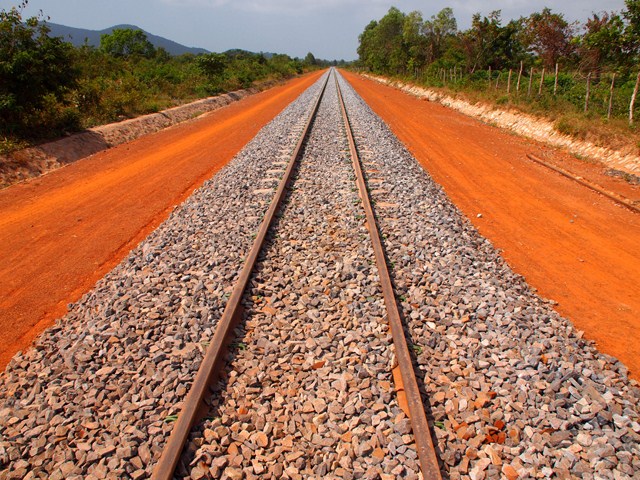
ផ្លូវដែកថ្មី នៅខេត្តកំពត។ រូបភាព ថតដោយ ផូល អ៊ែប កាលពីថ្ងៃទី ៤ ខែមករា ឆ្នាំ២០១២។ ក្រោមអាជ្ញាប័ណ្ណ CC BY 2.0 ។
រដ្ឋធម្មនុញ្ញនៃព្រះរាជាណាចក្រកម្ពុជា និងច្បាប់ភូមិបាលឆ្នាំ ២០០១ សុទ្ធតែបានធានានូវសិទ្ធិរបស់បុគ្គលក្នុងការទទួលបានការការពារកម្មសិទ្ធិ។ ទោះបីជាផ្នែកមួយនៃក្របខ័ណ្ឌគោលនយោបាយរបស់រដ្ឋាភិបាលកម្ពុជាចាប់តាំងពីឆ្នាំ ២០០២ ប៉ុន្តែរហូតដល់ឆ្នាំ ២០១០ ទើបក្របខ័ណ្ឌគតិយុត្តិជាធរមាន ដើម្បីគ្រប់គ្រងដំណើរការដែលរដ្ឋាភិបាលអាចដកហូតកម្មសិទ្ធិឯកជន ដោយសមស្រប និងយុត្តិធម៌ សម្រាប់បម្រើឲ្យគោលដៅសាធារណៈ។ បើទោះជាមានវឌ្ឍនភាពលើកិច្ចការពារផ្លូវច្បាប់ បញ្ហានៃការបណ្តេញចេញដោយបង្ខំ ទាំងដោយរដ្ឋ និងក្រុមហ៊ុនឯកជន នៅតែជាកង្វង់ក្នុងចំណោមសង្គមស៊ីវិលកម្ពុជា និងអង្គការអន្តរជាតិជាច្រើនទៀត។ មិនមានទិន្នន័យផ្លូវការ ប៉ុន្តែមានការប៉ាន់ប្រមាណថា អ្នករស់នៅរាជធានីភ្នំពេញប្រមាណជា ១២០,០០០នាក់ (ឬប្រហែលជា ១១ភាគរយ នៃប្រជាជនក្នុងរាជធានីសរុប) ត្រូវបានបណ្តេញចេញដោយបង្ខំ ចាប់តាំងពីឆ្នាំ១៩៩០មក។1
ក្របខ័ណ្ឌគតិយុត្តិ
ក្របខ័ណ្ឌគិតយុត្តិស្តីពីអស្សាមិករណ៍មានចងកាតព្វកិច្ចក្នុងច្បាប់អន្តរជាតិ។ យោងតាមច្បាប់អន្តរជាតិ ការតាំងទីលំនៅថ្មីដោយបង្ខំ និងដោយមិនមានការស្ម័គ្រចិត្ត ត្រូវបានចាត់ទុកថា ជាការដើរថយក្រោយនៃការទទួលបានសិទ្ធិមនុស្ស។ ប្រទេសកម្ពុជា គឺជាភាគីហត្ថលេខីនៃសន្ធិសញ្ញាអន្តរជាតិជាច្រើន ហេតុដូច្នេះ ត្រូវមានកាតព្វកិច្ចការពារប្រជាពលរដ្ឋរបស់ខ្លួន ប្រឆាំងនូវរាល់វិធានការធ្វើឱ្យសិទ្ធិមនុស្សធ្លាក់ចុះ ដែលដាក់ចេញមកដោយអង្គភាពរដ្ឋាភិបាល និងតតិយជន។2
អនុម័តកាលពីឆ្នាំ ២០១០ ច្បាប់អស្សាមិករណ៍ត្រូវបានធ្វើឡើង ដើម្បីធានាថា រាល់ការរឹបអូស កម្មសិទ្ធិ ត្រូវបានធ្វើឡើងដោយសមស្រប និងយុត្តិធម៌ ហើយម្ចាស់កម្មសិទ្ធិទទួលបានសំណងសមរម្យនិង យុត្តិធម៌ ជាមុន សំដៅបម្រើផលប្រយោជន៍ជាតិនិងសាធារណៈ និងអភិវឌ្ឍហេដ្ឋារចនាសម្ព័ន្ធសាធារណៈ។3 ការដកហូតអនុវត្តតែចំពោះកិច្ចការអភិវឌ្ឍហេដ្ឋារចនាសម្ព័ន្ធរូបវ័ន្តសាធារណៈ ដែលបម្រើឲ្យផលប្រយោជន៍សាធារណៈ និងប្រយោជន៍ជាតិប៉ុណ្ណោះ។ ឧទាហរណ៍ គម្រោងអនុវត្តទាំងនោះរូមមាន ការសាងសង់ហេដ្ឋារចនាសម្ព័ន្ធសម្រាប់ការដឹកជញ្ជូន (ផ្លូវអយស្ម័យយាន ផ្លូវថ្នល់ ស្ពាន។ល។) ការផ្គត់ផ្គង់អគ្គីសនី (ស្ថានីយ៍អគ្គីសនី ខ្សែបណ្តាញបញ្ជូន ។ល។) គមនាគមន៍ (ប្រៃសណីយ៍ ទូរគមនាគមន៍ និងប្រព័ន្ធបច្ចេកវិទ្យាព័ត៌មាន ។ល។) កន្លែងកំសាន្តសាធារណៈ (សួនច្បារ ទីលានសាធារណៈ ។ល។) គោលបំណងខាងអប់រំ វិទ្យាសាស្រ្ត និងវប្បធម៍ (សាលារៀន សាកលវិទ្យាល័យ សារមន្ទី ។ល។) សេវាសុខភាព (មណ្ឌលសុខភាព មន្ទីរពេទ្យ ។ល។) ការរុករក ធនធានធម្មជាតិ និង ឥន្ធនៈផូស៊ីល (រោងចក្រហ្គាស បណ្តាញបំពង់ប្រេងឥន្ធនៈ រោងចក្រចម្រាញ់ប្រេង ។ល។)។ អគារដែលរងការបំផ្លាញយ៉ាងធ្ងន់ធ្ងរដោយគ្រោះធម្មជាតិ ក៏អាចជាកម្មវត្ថុនៃការដកហូត ដូចគ្នា ទៅនឹងតំបន់វប្បធម៌ និងតំបន់វិទ្យាសាស្រ្តពិសេស ដែលផ្តល់ប្រយោជន៍ខាងបរិស្ថាន និងប្រវត្តិសាស្រ្ត ព្រមទាំងដីដែលត្រូវការចាំបាច់សម្រាប់ការតាំងលំនៅជាថ្មី ការការពារ និងការគាំទ្រសិទ្ធិរបស់ប្រជាពលរដ្ឋ កន្លែងកាត់ព្រំដែន ការពារជាតិ និងសន្តិសុខជាតិ។4
មានតែរដ្ឋទេដែលជាអាចធ្វើអស្សាមិករណ៍អចលនវត្ថុឯកជន និង ដើម្បីតែគោលដៅដូចមានរៀបរាប់ពីខាងដើម ដែលត្រូវតែធ្វើសម្រាប់ប្រយោជន៍សាធារណៈ និងជាតិ។5 រដ្ឋមិនអាចធ្វើអស្សាមិករណ៍អចលនៈវត្ថុឯកជន ក្រោមហេតុផលបន្លំថាបម្រើផលប្រយោជន៍សាធារណៈ និងជាតិបានឡើយ នៅពេលដែលគោលបំណងពិតប្រាកដគឺដើម្បីផ្ទេរអចលវត្ថុនោះ ទៅតតិយជនណាម្នាក់ដើម្បីប្រយោជន៍ឯកជន។ យ៉ាងណាក្តី ក្នុងបញ្ហាពាក់ព័ន្ធនឹងសុវត្ថិភាពសាធារណៈ សន្តិសុខជាតិ និងអាសន្ន6 រដ្ឋាភិបាលអាចធ្វើការដកហូតអចនលវត្ថុឯកជនជាបណ្តោះអាសន្ន ដោយមិនចាំបាច់មានការពិគ្រោះយោបល់ជាមុន។7
ស្ថិតក្រោមការគ្រប់គ្រងដោយគណៈកម្មធិការអស្សាមិករណ៍ ដំណើរការអស្សាមិករណ៍មានរយៈពេលយូរ និងចើនដំណាក់កាល ដូចជា សំណើគម្រោងសម្រាប់ការពិនិត្យរបស់រដ្ឋាភិបាល ការសិក្សាអង្កេតលម្អិតពីសិទ្ធិរបស់ម្ចាស់អចលនវត្ថុ ការជួបប្រជុំជាមួយអាជ្ញាធរមូលដ្ឋាន និងការជូនដំណឹងដល់ម្ចាស់អចលនវត្ថុឯកជន ក្រោមទម្រង់ជាសេចក្តីប្រកាសក្នុងវេទិការជាច្រើន។8 ម្ចាស់អចលនវត្ថុដែលត្រូវបានដកហូត មានសិទ្ធិដាក់ពាក្យបណ្តឹងជំទាស់សុពលភាពនៃការដកហូតនោះ ឬសុំឱ្យដកការម្រេចចិត្តស្តីពីការដកហូតនោះចេញ។9
ការផ្តល់សំណងសម្រាប់អចលនវត្ថុដែលត្រូវបានដកហូត ត្រូវតែយុត្តិធម៌ សមរម្យ និងទូទាត់ជាមុន។ សំណងត្រូវបានវាយតម្លៃទៅតាមតម្លៃមធ្យមលើទីផ្សារអចលនវត្ថុ ដោយមិនគិតពីការប្រែប្រួលតម្លៃ បន្ទាប់ពីសេចក្តីប្រកាស និងផលប៉ះពាល់នៃគម្រោងនេះ។10
នៅឆ្នាំ ២០១០ រដ្ឋាភិបាលកម្ពុជាបានចេញ សារាចរលេខ ០៣ ស្តីពីដំណោះស្រាយសម្រាប់ការតាំងទីលំនៅបណ្តោះអាសន្នលើដីដែលត្រូវបានកាន់កាប់ដោយខុសច្បាប់ក្នុងរដ្ឋធានី ក្រុង និងតំបន់ទីប្រជុំជន ។ សរាចរនេះ កំណត់ពីក្របខ័ណ្ឌសម្រាប់ដោះស្រាយសិទ្ធិដីធ្លីរបស់អ្នករស់នៅខុសច្បាប់ក្នុងការតាំងទីក្រៅផ្លូវការ។ យ៉ាងនេះក្តី ប្រសិទ្ធិភាពនៃសារាចរនេះ គឺមិនច្បាស់លាស់ឡើយ ដោយសារតែវាមានលំដាប់ទាបក្នុងឋានានុក្រមច្បាប់ និងកង្វះព័ត៌មានលម្អិតជាក់លាក់ពាក់ព័ន្ធនឹងរបៀបអនុវត្តក្នុងក្របខ័ណ្ឌគតិយុត្តិមានស្រាប់។11 ជាពិសេស សារាចរនេះ មិនបានផ្តោតលើគ្រួសារដែលកាន់កាប់ដីដោយស្របច្បាប់ ប៉ុន្តែត្រូវបានកំណត់ថាជាអ្នករស់នៅខុសច្បាប់ ដោយសារកង្វះលទ្ធភាពទទួលបានការចុះបញ្ជីដីធ្លី។12
បញ្ហាប្រឈម និងវឌ្ឍនភាព
ការអនុម័តលើច្បាប់ស្តីពីអស្សាមិករណ៍ បង្ហាញពីជំហានវិជ្ជមានគួរកត់សម្គាល់សំដៅធានាថា សិទ្ធិម្ចាស់កម្មសិទ្ធិករ ឬភោគីស្របច្បាប់ ដែលអចលនវត្ថុរបស់ពួកគេត្រូវបានដកហូតដោយរដ្ឋាភិបាល ត្រូវបានធ្វើឡើង សម្រាប់ប្រយោជន៍សាធារណៈ និងប្រយោជន៍ជាតិ។ ប៉ុន្តែ នៅតែមានចំណុចខ្វះខាតក្នុងបញ្ហាសន្តិសុខកម្មសិទ្ធិដីធ្លី។13 អង្គការមិនមែនរដ្ឋាភិបាល អ្នកសិក្សាស្រាវជ្រាវ និងប្រព័ន្ធផ្សព្វផ្សាយ កត់សម្គាល់ឃើញថា វិសាលភាពរបស់ច្បាប់នេះ មិនគ្របដណ្តប់ទៅលើការបណ្តេញចេញដោយក្រុមហ៊ុនឯកជន ឬសម្បទានិកទេ ហើយថែមទាំងមិនបានការពារបុគ្គលដែលមិនមានប័ណ្ណកម្មសិទ្ធិលើដី ឬរស់នៅលើអចលវត្ថុរបស់រដ្ឋ ដែលត្រូវបានចាត់ទុកថាជាអ្នករស់នៅខុសច្បាប់។14
ការិយាល័យឧត្តមស្នងការអង្គការសហប្រជាជាតិទទួលបន្ទុកសិទ្ធិមនុស្ស កត់សម្គាល់ឃើញថា សហគមន៍ចំណូលទាប ដែលកំពុងរស់នៅលើដីសាធារណៈក្នុងតំបន់ប្រជុំជន ងាយនឹងត្រូវគេសម្មត់ថា ខុសច្បាប់ និងរស់នៅជាមួយការគំរាមកំហែងពីការបណ្តេញចេញដោយបង្ខំ។15 ដូចគ្នាទៅនឹងគ្រួសារនៅជនបទដែរ សារព័ត៌មាន ភ្នំពេញ ប៉ុស្តិ៍ បានរាយការណ៍ពីឧប្បត្តិហេតុមួយដែលកើតឡើងកាលពីខែមេសា ឆ្នាំ២០១៥ ថា បើទោះបីជាមានការបដិសេធដោយមន្រ្តីរដ្ឋាភិបាល ដែលបានស្នើសុំក្រុមហ៊ុនឱ្យរង់ចាំរហូតដល់មានការព្រមព្រៀងដោយសន្តិភាពក៏ដោយ ក៏សម្បទានិកបានកំពុងតែគំរាមបណ្តេញអ្នកភូមិដែរ។16 ភស្តុតាងពីការសិក្សាស្រាវជ្រាវ បង្ហាញថា ជាញឹកញាប់ ការបណ្តេញចេញដោយបង្ខំនាំឱ្យមានកំណើនលើភាពក្រីក្រ និងបំណុល ភាពរឹតត្បិតក្នុងការទទួលបានចំណូល ទឹក និងអនាម័យ នាំឱ្យ មានបញ្ហាសុខភាព ការមាក់ងាយក្នុងសង្គម និង រំខានដក់បណ្តាញសង្គម។17
ទាក់ទងនឹងអស្សាមិករណ៍
- ចំណាត់ថ្នាក់ដីធ្លី
- សិទ្ធិមនុស្ស
- សិទ្ធិដីធ្លី ផ្ទះសម្បែង និងការបណ្តេញចេញ
បច្ចុប្បន្នភាពចុងក្រោយ ថ្ងៃទី១ ខែវិច្ឆិកា ឆ្នាំ២០១៥
ឯកសារយោង
- 1. ការិយាល័យឧត្តមស្នងការអង្គការសហប្រជាជាតិទទួលបន្ទុកសិទ្ធិមនុស្សប្រចាំនៅកម្ពុជា. ឆ្នាំ២០១២. “ការបណ្តេញចេញ និងការតាំងទីលំនៅថ្មីនៅកម្ពុជា ៖ តម្លៃមនុស្ស ផលប៉ះពាល់ និងដំណោះស្រាយ.” អង្គការសហប្រជាជាតិ. http://cambodia.ohchr.org/WebDOCs/DocProgrammes/Resettlement_Study-28_Feb_2012_Eng.pdf ។
- 2. ណាតាលី និង មីដាឡូ. ឆ្នាំ២០១២. “រត់ខុសផ្លូវ ៖ ការសិក្សាពីដំណើរការតាំងទីលំនៅថ្មី និងផលប៉ះពាល់នៃការស្តារផ្លូវដែកកម្ពុជា.” អង្គការស្ពានឆ្លងព្រំដែន. http://www.babcambodia.org/derailed/derailed.pdf ។
- 3. ច្បាប់អស្សាមិករណ៍ (ឆ្នាំ២០១០), មាត្រា ៤. http://ppp.worldbank.org/public-private-partnership/library/cambodia-law-expropriation ។
- 4. ដូចខាងលើ, មាត្រា ៥។
- 5. ដូចខាងលើ, មាត្រា ៧។
- 6. ដូចខាងលើ, មាត្រា ៩។
- 7. ដូចខាងលើ, មាត្រា ១០។
- 8. ដូចខាងលើ, មាត្រា ១៥-២៩។
- 9. ដូចយោងខាងលើ។
- 10. ដូចខាងលើ មាត្រា ២២-២៩។
- 11. លីនស្រ្តូម. ឆ្នាំ២០១៣. ទំព័រ ៦៦។
- 12. ដូចខាងលើ។
- 13. មជ្ឈមណ្ឌលសិទ្ធិមនុស្សកម្ពុជា. ឆ្នាំ២០១៣. “ប្រទេសកម្ពុជា: ដីធ្លីនៅក្នុងជម្លោះ-ទិដ្ឋភាពទូទៅនៃស្ថានភាពដីធ្លី.” http://bit.ly/1KtPNVy ។ ណូរ៉ា លីនស្រ្តូម. ឆ្នាំ២០១៣. “គោលនយោបាយសម្រាប់ជនក្រីក្រ? ភ្នំពេញ, សន្តិសុខកម្មសិទ្ធិ និងសារាចរលេខ០១.” រាជធានីភ្នំពេញ: កិច្ចផ្តួចផ្តើមទីប្រជុំជន. www.academia.edu /8476693/Policy_for_the_Poor_Phnom_ Penh_Tenure_Security_and_Circular_03 ។ សែន ដេវីត. ឆ្នាំ២០១៥. “គ្រួសារនៅខេត្តបាត់ដំបង់ ត្រូវបានប្រាប់ឱ្យរើចេញសម្រាប់សួនច្បារថ្មី.” ភ្នំពេញ ប៉ុស្តិ៍. ថ្ងៃទី ៤ ខែកុម្ភ. http://www.phnompenhpost.com/battambang-families-told-make-way-new-park ។
- 14. ដូចយោងខាងលើ។
- 15. ការិយាល័យឧត្តមស្នងការអង្គការសហប្រជាជាតិទទួលបន្ទុកសិទ្ធិមនុស្សប្រចាំនៅកម្ពុជា. ឆ្នាំ២០១២។
- 16. ម៉ៃ ទិត្យថារ៉ា. ឆ្នាំ២០១៥. “អ្នកភូមិ ៖ ក្រុមហ៊ុនសហភាពអភិវឌ្ឍន៍ បង្កការគំរាមបណ្តេញចេញជាថ្មី.” ភ្នំពេញ ប៉ុស្តិ៍. ថ្ងៃទី ២១ ខែ មេសា. http://www.phnompenhpost.com/national/udg-issuing-eviction-threats-again-villagers។
- 17. មជ្ឈមណ្ឌលសិទ្ធិមនុស្សកម្ពុជា.ឆ្នាំ២០១៣. ទំព័រ៣២។

